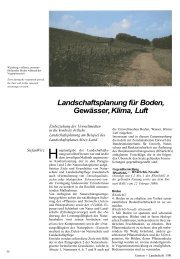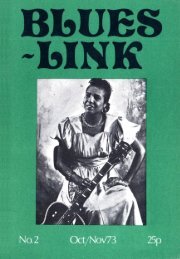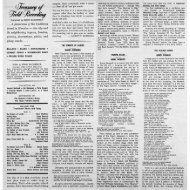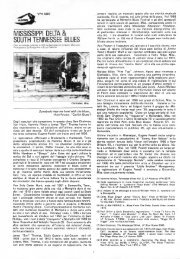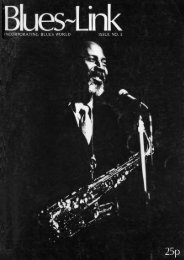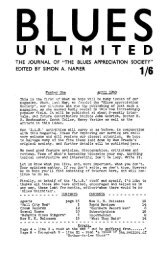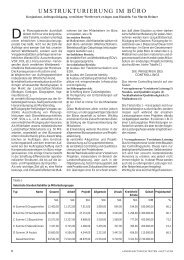The Blues Collection 84: EAST COAST BLUES.- Orbis Publishing ...
The Blues Collection 84: EAST COAST BLUES.- Orbis Publishing ...
The Blues Collection 84: EAST COAST BLUES.- Orbis Publishing ...
You also want an ePaper? Increase the reach of your titles
YUMPU automatically turns print PDFs into web optimized ePapers that Google loves.
THE STORY OF THE <strong>BLUES</strong><br />
<strong>84</strong>: <strong>The</strong> Young Generation Comes of Age<br />
In the 1980s a n e w crop of Chicago blues artists g re w up, nourished by the old traditions but<br />
ready to seek fresh inspiration. A decade later, they had, mostly, fulfilled their promise.<br />
Having previewed the 1980s, so to<br />
speak, with their six albums of Living<br />
Chicago <strong>Blues</strong>, the musical watchdogs<br />
at Alligator Records took a few years’<br />
nap and woke up in 1987 with the<br />
same idea. Well, not quite. This time<br />
there would be just one album and,<br />
unlike the earlier project, it would leave<br />
no space for veteran keepers of the<br />
flame. <strong>The</strong> New Bluebloods was<br />
designed to introduce, in the words of<br />
its subtitle, <strong>The</strong> Next Generation of<br />
Chicago <strong>Blues</strong>’.<br />
So bold an assertion amounts to a<br />
bet. Less than ten years on it seems fair<br />
to ask how many of the Bluebloods<br />
runners paid off.<br />
And the answer is most of them. One<br />
who didn’t, but takes no blame for it,<br />
was Valerie Wellington, an extremely<br />
promising singer in the mould of Koko<br />
Taylor, who had already excited<br />
blueswatchers with her 19<strong>84</strong> album<br />
Million Dollar Secret (Rooster <strong>Blues</strong>)<br />
but who died, tragically young, a few<br />
years later. Not much has been heard<br />
lately of John Watkins, then 33 and<br />
working with his uncle Jimmy Johnson.<br />
But as for the others...<br />
Family members<br />
<strong>The</strong> big success story belongs to the<br />
Kinsey Report. <strong>The</strong>y had started out as<br />
the backing group for Big Daddy Kinsey,<br />
a Muddy Waters devotee and father of<br />
three members of the band, but guitarist<br />
Donald Kinsey took a wide detour<br />
from Chicago blues during the 1970s,<br />
forming a rock band then going over to<br />
reggae and working with Peter Tosh<br />
and Bob Marley. He returned home in<br />
19<strong>84</strong> and rejoined the family group,<br />
which went on to play in Europe and<br />
make powerful albums for Pointblank.<br />
Melvin Taylor, like Jimmy Johnson and<br />
Jimmy Dawkins before him, found fame<br />
easier to acquire in Europe, where he<br />
had made a couple of albums even<br />
before Bluebloods. Like Dawkins, he too<br />
is an all-over-the-guitar player, whose<br />
expertise is touched with the spirit of<br />
Jimi Hendrix - an important model for<br />
many blues guitarists of his generation.<br />
Singer, guitarist and tenor sax player<br />
Maurice John Vaughn had caught<br />
blueslovers’ attention in the mid-1980s<br />
with the witty move of releasing an<br />
album in a plain white cover under the<br />
title Generic <strong>Blues</strong>. On the evidence of<br />
his 1993 set In the Shadow of the City<br />
(Alligator), Vaughn is a developing talent<br />
worth watching, not least for his<br />
pungent songwriting.<br />
Imperial style<br />
Alligator also nurtured Lil’ Ed Williams, a<br />
musician of another stripe altogether.<br />
Nephew of bluesman J. B. Hutto, he<br />
absorbed every last raw drop of that<br />
energetic singer and slide-guitar player’s<br />
musical spirit. From the mid-1970s<br />
onwards, with his band the <strong>Blues</strong><br />
Imperials, Lil’ Ed filled the role of<br />
Chicago Chainsaw <strong>Blues</strong> Massacre Man<br />
previously played by his uncle and<br />
before him by Hound Dog Taylor.<br />
Booked to record a single track for<br />
Bluebloods, the band piled into the<br />
studio and emerged little more than<br />
three hours later with enough stuff to fill<br />
an album, which Alligator duly produced<br />
- Roughhousin'.<br />
<strong>The</strong> Sons of <strong>Blues</strong> were the only band<br />
in the Bluebloods cast to have been<br />
featured on Living Chicago <strong>Blues</strong>. <strong>The</strong><br />
1987 line-up was somewhat different,<br />
since the group had merged with<br />
bassist J. W. Williams’ Chi-Town Hustlers<br />
(retaining both names), but still boasted<br />
the best of the younger harmonica<br />
players, Billy Branch, then 35. A decade<br />
later he remained a top-rated player,<br />
ABOVE: <strong>The</strong> Kinsey Report, one of several bands<br />
who, during the 1980s and 1990s, worked hard to<br />
keep the Chicago blues young at heart.<br />
much in demand for harp cameos on<br />
other people’s records.<br />
<strong>The</strong> Bluebloods liner notes made no<br />
fuss about it, but guitarist Dion Payton’s<br />
43rd Street <strong>Blues</strong> Band offered a sight<br />
rare in Chicago blues groups, a white<br />
female guitarist. Since then Joanna<br />
Connor has become known as a blues-<br />
rock guitar heavy with a big following in<br />
Europe, where she has recorded for<br />
the German labels Ruf and Inak.<br />
All sorts of old barriers were breaking<br />
down. Several Chicago bands had<br />
members from Canada, Europe or<br />
Japan. <strong>The</strong> flow of musicians from soul<br />
to blues and blues to soul was brisker<br />
than ever and, as Alligator’s Bruce<br />
Iglauer pointed out in the Bluebloods<br />
notes, ‘the influence of both rock and<br />
black radio can be heard in new<br />
rhythms, new instruments (synthesisers<br />
are common on the scene now, and<br />
many a guitarist has his array of effects<br />
pedals), and an increased emphasis on<br />
instrumental technique and flash. But<br />
the raw soul of Chicago,’ he concluded,<br />
‘is still there in the city’s music.’




